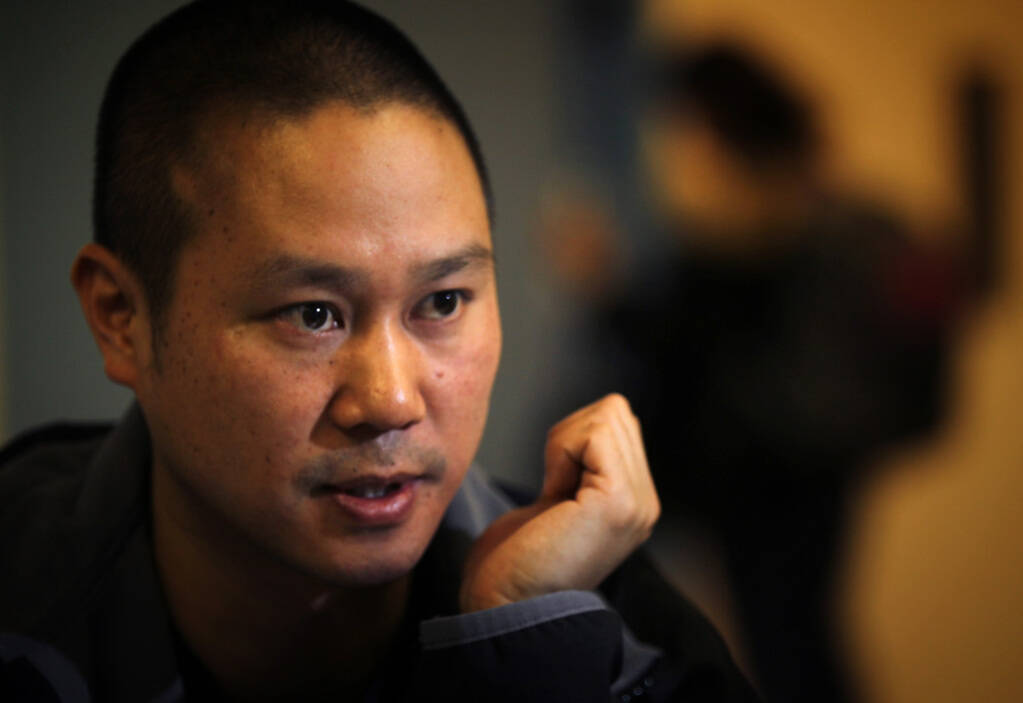New documents detail Hsieh’s erratic behavior, question validity of POA agreement

New court filings from the family of late Zappos CEO Tony Hsieh provide a more detailed outline of the tech mogul’s alleged erratic behavior in the months leading to his death, while also challenging the validity of a power of attorney agreement.
In January 2022, attorney Puoy Premsrirut sued Hsieh’s estate, seeking legal fees for what she alleged was a yearlong contract beginning in July 2020.
Hsieh was 46 when he died on Nov. 27, 2020, from injuries he suffered in a Connecticut house fire, following months of bizarre and erratic behavior documented in numerous legal battles since his death.
Hsieh’s estate filed a counterclaim alleging that Premsrirut and several of Hsieh’s business associates, including former Life is Beautiful CEO Andrew Donner, took advantage of Hsieh while he was abusing drugs.
The estate filed court documents on Oct. 23 in its first step to challenge a judge’s previous ruling dismissing several of the family’s counterclaims.
The estate has claimed that Premsrirut and Donner helped facilitate Hsieh’s purchase of the Zappos building in downtown Las Vegas for $70 million, allegedly significantly higher than the building’s worth.
Attorneys for Donner and Hsieh’s business associates Todd Kessler and Thomas Spiegel have argued that the building was properly appraised at $71 million. They have also alleged that the family’s claims are “sensationalized.”
“We think the judge properly dismissed the Estate’s claims against the lawyers,” attorney Brad Brian, who represents Hsieh’s business associates, said in an emailed statement. “I think the Estate’s claims against my clients are equally meritless.”
Attorneys for Premsrirut did not immediately respond to a request for comment on Friday.
Attorney contract of $2.2M
The estate’s latest filing argued that Premsrirut was aware Hsieh was incapacitated when she procured a $2.2 million contract to work as his attorney in the months before his death.
“She signed off as counsel on deals she knew were overinflated and outrageous, knowing Tony was not capable of understanding the nature and consequences of those deals,” according to the motion. “Instead of meeting her obligations as his counsel, she served others’ interests as the gatekeeper to madness and delusion.”
The new motion also questioned a power of attorney agreement from July 2020, which authorized Hsieh’s cousin, Connie Yeh, to act on his behalf.
According to documents filed by the estate’s attorneys, Hsieh started using ketamine in late 2019, culminating in a “severe psychotic break” while Hsieh was in Montana in June 2020.
Before the trip, Hsieh’s friends noted that he had lost significant weight, was writing symbols all over his body with markers, and had made concerning statements such as being “God of The Universe,” and believing he could cure COVID-19.
While in Montana traveling on a bus, Hsieh offered people $1 million to enter a suicide pact with him and was found in the vehicle’s shower “spreading feces on himself,” according to court documents filed by the estate.
About a month after the Montana bus trip, around the time the power of attorney agreement was executed, Hsieh was seen using nitrous oxide gas “nonstop,” and was suffering from memory problems, according to court documents.
Prior court filings have documented Hsieh’s behavior before his death while he was living in Park City, Utah, where Hsieh funneled millions of dollars into elaborate projects, including a plan to create a theme park where visitors would use tarot cards and seashells as currency.
Hsieh also wanted Park City to become “the hot air balloon capital of the world,” and planned “to put hot air balloons above Jeff Bezos’ house to block Mr. Bezos’ access to the sun,” according to the recent court filing.
Agreement in August 2020
Premsrirut began communicating with people in Hsieh’s orbit in Park City in July 2020, and secured the agreement to serve as his attorney a month later, the motion stated. Yeh then relied on Premsrirut to tell her what was happening in Utah.
According to the motion, Yeh was unaware that Hsieh was admitted to a rehab facility in February 2020 and had been hospitalized after the trip to Montana, and Premsrirut did not express any concern to Yeh about Hsieh’s behavior until September 2020.
The estate also filed a countersuit on Wednesday in a separate legal battle over the “Delivering Happiness” brand, which promotes Hsieh’s vision of workplace culture.
Jennifer Lim, who helped create and develop Hsieh’s 2010 book “Delivering Happiness: a Path to Profit, Passion, and Purpose,” sued the estate earlier this year, claiming that the estate has demanded ownership of a book Lim authored after Hsieh’s death.
Attorneys for Hsieh’s family claimed in the countersuit that Lim began writing the book “Beyond Happiness” while Hsieh’s mental state was “rapidly deteriorating” in 2020, and that she was aware of Hsieh’s mental condition after spending several days in Park City. The estate claimed that Lim’s book constitutes copyright and trademark infringement against Winkey LLC, a company Lim created with Hsieh to promote the 2010 book.
Lim’s attorneys did not respond to a request for comment on Friday.
“Clearly, “Beyond Happiness” — as a sequel or derivative work based on “Delivering Happiness” — was an opportunity that belonged to Tony and/or Winkey,” the countersuit stated. “It did not belong personally to Lim or any of her personally owned entities.”
A previous version of this story misstated the date of Tony Hsieh’s death.
Contact Katelyn Newberg at knewberg@reviewjournal.com or 702-383-0240.